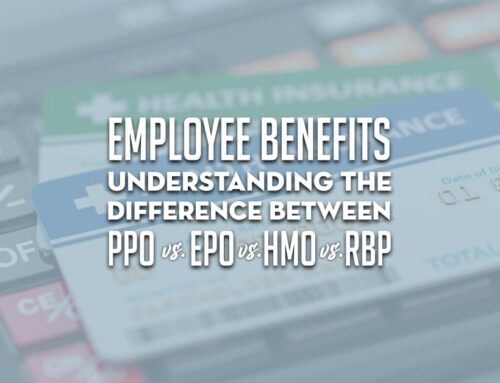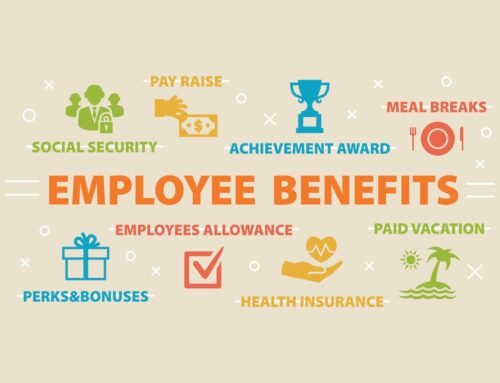When someone is looking for a new job or determining whether they want to stay in their current job, they need to weigh the pros and cons. Only a portion of their decision is about their salary, though.
Many times, it comes down to employee benefits for small business workers. If they aren’t getting decent benefits, they are more likely to seek employment elsewhere. Those employees who are still at the company may not feel as connected to or passionate about the work they are doing. This can lead to reduced productivity and other issues.
Therefore, most companies today, larger or small, understand that they need to provide their employees with quality benefits. Let’s get a closer look at some of the most common types of benefits companies can offer.
What Are Common Employee Benefits?
Companies that want to hold onto employees and bring aboard high-quality employees will want to provide the right types of benefits, as mentioned.
However, if you are a new or small company, you might be wondering what sorts of benefits to offer. Often, it will depend on your finances and what you can do right now. You can always expand your benefits later. Below are some of the most desirable employee benefits.
- Health insurance
- Flexible scheduling
- Paid time off
- Dental insurance
- Vision insurance
- Life insurance
- Mental health benefits
- Paid family leave
- Disability insurance
- Professional development
Of course, these are just some of the many different types of benefits that could help to attract and retain employees. Other options some employees may want include daycare services and wellness programs.
Daycare Services Are Popular Benefits
Parents who have small children who need daycare services pay a lot of money each month to have their children cared for when they aren’t home. This eats into their earnings, and they may get to the point where it’s cheaper for them to stay home.
Offering free or cheaper daycare for them keeps the employees happy and the children safe. It also means your employees aren’t spending all of their money on daycare.
Wellness Programs
While options like group health insurance are always going to be the major benefits that employees truly want, wellness plans will also be appreciated.
These programs can help to reduce healthcare costs, as keeping employees healthier from the start means fewer illnesses. It also means fewer absences, as well as increased productivity.
The type and extent of the wellness program can vary. It might include offering free, healthy snacks in the breakroom, offering discounts to a local gym, or having a room where people can take an occasional mental break. Having a room for mothers who need to use breast pumps is yet another simple but appreciated benefit.
Different companies will have different needs and means. You can find elements that will work for you and that your employees will appreciate.
Employees Love Small Business Health Insurance
One of the biggest worries in the United States today is the cost of healthcare. It is extraordinarily expensive, and without health insurance, it would be next to impossible for most people to pay in the event of an illness or injury.
This is why health insurance is coveted as an employee benefit. Employees know how valuable good insurance is, which means your company should strive to offer employees the best coverage you can afford.
Small businesses could offer either an HRA or an HSA for their employees, for example. Let’s take a look at each of these, so you can see what they are and what they offer.
- HRA – Healthcare Reimbursement Arrangement
- HSA – Health Savings Account
Both of these provide employees with affordable healthcare coverage that can provide financial support to pay for various healthcare-related expenses.
Both generally feature deductible-based health plans. Employees tend to like these options because it provides them with more control over the plans they choose.
An HRA is funded entirely by the employer and funds are available from the first day of coverage. It offers tax benefits to employers, who will have control over the design of the HRA plan.
HSAs have advantages, too. They can act as a savings vehicle for employees, provide tax benefits, and payments can be deducted through payroll to make participating easy for employees.
What type of small business health insurance is a good option for your company? Every business is different.
The best way to determine what type of plans to offer is by speaking with your health insurance broker. The brokers can go over the costs, the benefits, and more, so you can get a plan that is affordable for you and that will make your employees happy.
Employer Contributions for Health Plans
The employer contribution is the amount of money an employer pays into a health plan. These contributions will help to pay for the healthcare costs of the employees including premiums and prescription drugs.
Some employers may contribute to the Health Savings Account of an eligible employee, for example. Although this is not a requirement, it is something many employers will do, as it can provide some advantages.
The contributions made by the employer are not considered part of the employee’s income, which means they are not subject to federal income tax, Social Security, or Medicare tax. When an employer contributes to the HSA, it will be appreciated by the employees.
Even better, at least from the company’s perspective, is that the contributions are tax-deductible for the business.
Bring Aboard Great Benefits and Retain Great Employees
Without a doubt, options like group health insurance will always be the benefit most employees want. It provides them with peace of mind in the event of illness or injury.
However, it’s not the only benefit your company should offer. Consider the other benefits mentioned above and see how some of those could be used by your company, as well.
The goal is to create a company where people want to work and do well. The right benefits engage employees, drive productivity, and reduce the amount of turnover you have.




